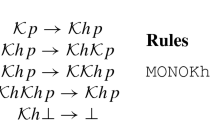
Overview
- Provides both the relevant technical background and an overview of the key applications of neighborhood semantics in modal logic
- Introduces the main techniques for reasoning about neighborhood structures with a modal language
- Highlights the most convincing applications of neighborhood semantics for modal logic
- Includes applications such as coalitional logic, game logic, dynamic logics of belief and evidence, subset space logic, and first-order extensions
- Explains the precise relationship between neighborhood models and relational models, topological models, plausibility models, and (two-sorted) first-order logic
- Includes supplementary material: sn.pub/extras
Part of the book series: Short Textbooks in Logic (STXLO)
Access this book
Tax calculation will be finalised at checkout
Other ways to access
About this book
In addition, the book discusses a broad range of topics, including standard modal logic results (i.e., completeness, decidability and definability); bisimulations for neighborhood models and other model-theoretic constructions; comparisons with other semantics for modal logic (e.g., relational models, topological models, plausibility models); neighborhood semantics for first-order modal logic, applications in game theory (coalitional logic and game logic); applications in epistemic logic (logics of evidence and belief); and non-normal modal logics with dynamic modalities.
The book can be used as the primary text for seminars on philosophical logic focused on non-normal modal logics; as a supplemental text for courses on modal logic, logic in AI, or philosophical logic (either at the undergraduate or graduate level); or as the primary source for researchers interested in learning about the uses of neighborhood semantics in philosophical logic and game theory.
Similar content being viewed by others
Table of contents (3 chapters)
-
Front Matter
-
Back Matter
Reviews
“Reading and writing a review of this wonderful book has been a pleasure. Knowing the basics of propositional modal logic may explain why I enjoyed reading it. The author has gathered and surveyed many papers in writing this book. This is a must-read for those who want to do research on neighborhood semantics--after having acquired a basic knowledge of modal logic.” (Manoj K. Raut, Computing Reviews, February, 2019)
Authors and Affiliations
About the author
Accessibility Information
Accessibility information for this book is coming soon. We're working to make it available as quickly as possible. Thank you for your patience.
Bibliographic Information
Book Title: Neighborhood Semantics for Modal Logic
Authors: Eric Pacuit
Series Title: Short Textbooks in Logic
DOI: https://doi.org/10.1007/978-3-319-67149-9
Publisher: Springer Cham
eBook Packages: Religion and Philosophy, Philosophy and Religion (R0)
Copyright Information: Springer International Publishing AG 2017
Softcover ISBN: 978-3-319-67148-2Published: 23 November 2017
eBook ISBN: 978-3-319-67149-9Published: 15 November 2017
Series ISSN: 2522-5480
Series E-ISSN: 2522-5499
Edition Number: 1
Number of Pages: XII, 154
Number of Illustrations: 17 b/w illustrations
Topics: Logic, Mathematics of Computing, Mathematical Logic and Foundations, Mathematical and Computational Engineering, Logics and Meanings of Programs
Keywords
- Neighborhood Semantics for Modal Logic
- Non-normal Modal Logic
- Scott-Montague Semantics
- Neighborhood Semantics for First-order Modal Logic
- Game Logic
- Topology and Modal Logic
- Dynamic Logic of Evidence-Based Beliefs
- Weak Systems of Modal Logic
- Coalitional Logic
- Lewis Sphere Models
- Epistemic Logic
- Logic and Game Theory
- Conditional logic
- Bisimulations for neighborhood models
- Subset space logic
- Possible world semantics
- Relational models with impossible worlds
- Relational semantics for modal logic
- Weak systems of common belief
- Comparing normal and non-normal modal logic


